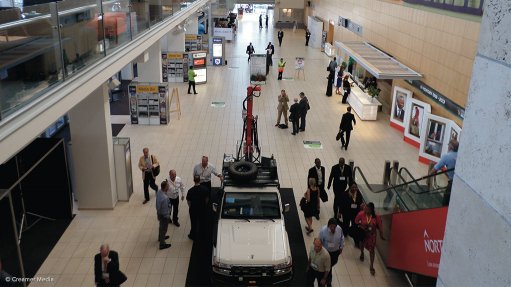
EXPORT AUDIENCE The South African Electrotechnical Export Council will facilitate the participation of emerging manufacturing exporters in a series of exhibitions this year
In support of the Department of Trade and Industry’s (DTI’s) drive to diversify and increase the base of South African exporters, the South African Electrotechnical Export Council (SAEEC) – a nonprofit public–private partnership between South African business and the DTI – has embarked on a programme to develop small, medium-sized and microenterprises (SMMEs) in the electrotechnical sector to supply manufactured goods and services to large infrastructure projects.
SAEEC CEO Chiboni Evans tells Engineering News that Africa’s power sector is the main focus in the initial stages of the programme and, because of the global focus on developing power infrastructure in Africa, the power sector presents significant business opportunities for South African manufacturers.
“The Power Africa initiative, launched by US President Barack Obama in 2013, aims to ensure that 70% of Africa is electrified by 2030. This will require an estimated investment of $7-billion a year in Africa’s power infrastructure projects over the next 15 years,” she adds.
This prompted the SAEEC to develop a programme this year that will recruit, retain and develop emerging exporters in the electrotechnical sector, which comprises electronics, electrical engineering, information technology and telecommunications.
The programme also aims to expose companies to export opportunities through technical training and profiling them at key events where decision-makers representing the power pools of West and East Africa are present, says Evans.
“Currently, 53% of the SAEEC’s members are SMMEs, 12% of which can be classified as emerging exporters, as per the DTI’s definition,” she notes, adding that the council intends to expand this base by recruiting and supporting sustainable SMMEs, particularly those owned by black people and women.
Evans tells Engineering News that the SAEEC's SMME membership, although commendable at 53%, only comprises a few companies that are majority black-owned and/or women-owned enterprises.
“Our initial focus is, therefore, to identify those predominately black-owned and woman-owned enterprises and to develop them as emerging exporters in the electrical engineering and electrotechnical sectors.”
Evans says the first ten companies that are participating in the SAEEC's current emerging exporter development programme are 25% women-owned, with four of them also 100% black-owned.
Exhibition Events
Evans says African Utility Week (AUW), which took place from May 12 to 14, in Cape Town, was the first in a series of exhibitions that emerging exporters will participate in this year.
She adds that 36 member companies of the SAEEC, including 11 emerging exporters, exhibited at AUW, with the larger companies having supported and mentored the emerging exporters during the event.
The other proposed events are the East African Power Industry Convention, which will take place in August, in Kenya, and the West African Power Industry Convention, which will take place in November, in Nigeria.